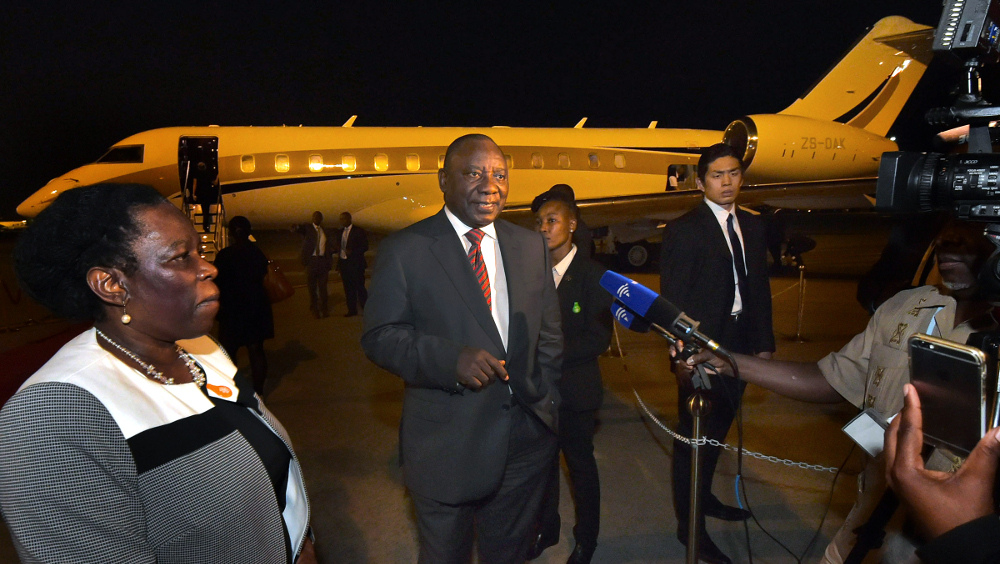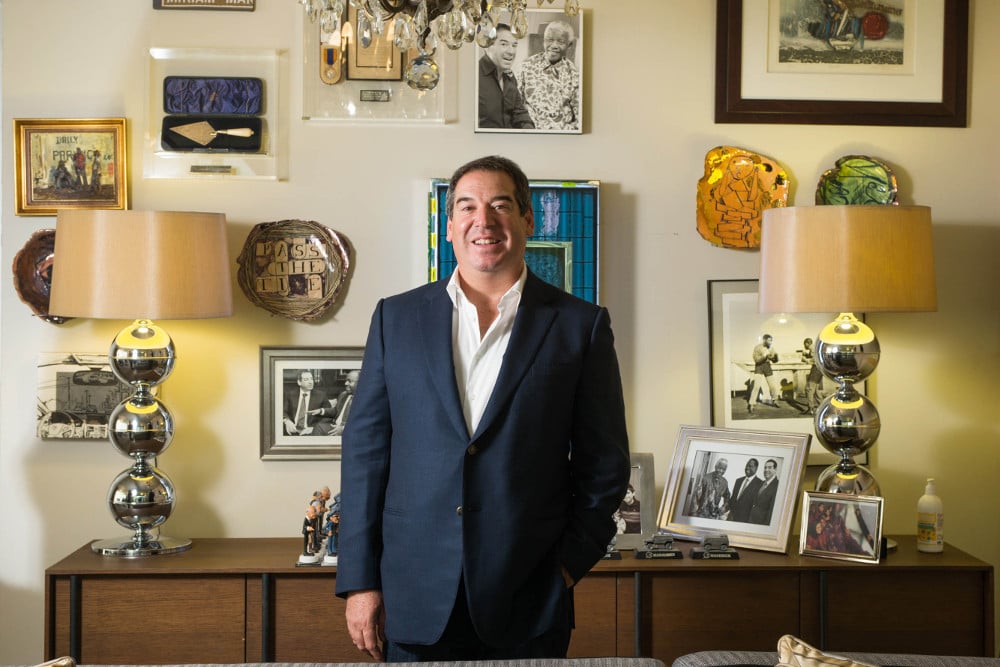It is rumoured that more aeroplanes will be bought or leased for use by VVIPs such as President Jacob Zuma
With a bit more luck, Deputy President Cyril Ramaphosa could have found himself using a private plane associated only with colonial-era mining, or perhaps a fortune founded on tobacco. With a bit less luck, he could have ended up on a plane controlled by a prominent ANC supporter who is also an arms merchant.
As it turned out, Ramaphosa arrived in Japan three weeks ago on a chartered plane owned by a Gupta-family company, leading to a medium-sized public outcry – big enough to warrant a rare statement from Defence Minister Nosiviwe Mapisa-Nqakula, but not so big as to draw Ramaphosa into the debate.
Thanks to a half-decade of bumbling on the matter of “VVIP” – very very important person – planes that mini-furore is guaranteed to play out again in the near future with only minor variations.
If the deputy president has to travel out of the country while President Jacob Zuma is in New York at the general assembly of the United Nations later this month, for instance, Ramaphosa’s office is likely to face a limited choice of aircraft for his use – all with political associations that serve as perfect ammunition for opposition political parties.
Thanks to what the South African Air Force argues is a shortage of suitable planes in its fleet, a shortage of air force pilots for the planes it does have and stringent requirements for the amenities that must be available on a VVIP flight, the number of privately owned planes in South Africa Ramaphosa could use is tiny.
And unless it wants to raise the ire of the auditor general again, the air force may only hire such a private plane from one of two companies: Fortune Air, controlled by arms manufacturer Ivor Ichikowitz, or ExecuJet, the company that brokered the deal that saw Ramaphosa use the plane owned by the politically connected Guptas.
Meanwhile, the long-running search for a solution to the problem – which has previously seen resignations at the top of the defence establishment and pitched battles between Cabinet ministers – seems set to provide opposition parties with an early Christmas present this year.

According to the latest in a series of rumours that have circulated for years, in October or November the air force will again broach the issue of buying or leasing more planes exclusively for the use of VVIPs, which in effect means Zuma, Ramaphosa and Mapisa-Nqakula. And the eye-watering cost of such an exercise will inevitably again cause trouble, as it has regularly ever since Zuma took office in 2009.
This week the defence ministry and companies involved in charters referred questions about VVIP air transport to the air force, which in turn referred them to various internal departments, none of which could answer. But one person with an intimate knowledge of events said plans are afoot to bolster 21??Squadron, the unit dedicated to transporting top government officials.
“It happens every budget cycle because every time there is somebody who thinks they have a new way to finally get it done,” said this source.
Previously abandoned plans have included spending R800-million to lease new aircraft, spending R2-billion on a single Boeing 777-200 and spending R2-billion on a package of three different, smaller aircraft. None of the plans found a warm public reception and were dropped, sometimes quietly and sometimes in a blaze of attention, such as when Mapisa-Nqakula cancelled a deal put together by her predecessor, Lindiwe Sisulu, as soon as she took office.
To fill the gap, the air force chartered private planes to transport its VVIPs. That led to controversy because of the huge costs of ferrying especially Sisulu and Zuma, and the auditor general came down hard on the air force for failing to contain costs through competitive tendering.
To make sure the auditor general’s stipulations were met, VVIP requirements were added to RT61, a transversal contract managed by the national treasury that deals with renting aircraft for such tasks as the transportation of illegal immigrants or surveying river systems. That contract creates a preapproved set of suppliers of aircraft, making for quick but cost-competitive hiring.
But RT61 turned had its troubles too and, after Ramaphosa’s flight to Japan, Mapisa-Nqakula admitted there may be security issues to consider when the process could mean the state does not know who owns the plane used by a head of state.
“These are matters that I have requested that the [air force] verifies and confirms in order for us to assess if any risk or compromise of security and integrity arises as a result of the current arrangements on the RT61, and to consider various options at our disposal to remedy such risks in consultation with the national treasury,” Mapisa-Nqakula said at the time.

Cyril Ramaphosa arriving in Japan in a Gupta-owned plane. (Kopano Tlape)
The current version of RT61 is due to run until April 2017, and could be extended beyond that on a month-to-month basis.
“It is just structured in such a way that the problems are going to come back to haunt them again and again and again,” said Darren Olivier, senior correspondent at African Defence Review, who has closely studied the RT61 contract.
More general problems around the cost of planes came back to haunt Zuma again this week. Responding to a written question by Democratic Alliance leader Mmusi Maimane, Zuma on Wednesday said the presidency and the department of international relations had spent exactly R179 124.93 on airfare when a delegation of 80 people visited Russia on an official visit in May.
Although that may be technically true, Zuma’s number excludes millions spent by the air force – rather than the presidency – to get Zuma to Russia and back. After the air force-owned presidential jet Inkwazi developed a minor problem in Russia, two different jets were chartered to fetch Zuma at an estimated cost of more than R2-million.
Mapisa-Nqakula has consistently refused to answer questions on that incident, or similar instances, on the grounds of security.
That has not stopped the questions from particularly the DA and, more recently, the Economic Freedom Fighters.
“The fact is that there are only a handful of aircraft you can use for head-of-state-level transport,” said aviation expert Linden Birns, “especially if you want the ability to run the country from the plane or have the kind of countermeasures you need if you go places where not all the people are necessarily friendly. To do that, you have to own the plane.”

Ivor Ichikowitz’s company leases aircraft to the state. (Waldo Swiegers, Bloomberg)
Analysts have suggested the government buy VVIP-capable planes that can be reconfigured to carry larger numbers of troops in less comfort to make for a more politically palatable purchase. The air force and successive defence ministers have resisted, with one former air force officer saying it was a sure way to turn a public relations problem into a bigger public relations problem.
“Now you have opposition parties saying we spend too much on the president,” said the former officer. “If you have dual-use planes, you’ll have opposition parties asking how often they transport troops and how often they transport the president. Then it becomes about not doing right by our soldiers.”
Olivier argues that the continuing mess around presidential planes is a symptom of a general lack of policy clarity and political will, and the issues the defence force is facing.
“The Gupta plane Ramaphosa used was because of a shortage of air force pilots and crew, not a shortage of planes,” he said. “It was a matter of staff and funding at the VIP squadron, and the air force.”
Unless the air force gets the money to train the pilots it needs, Olivier said, there will not be enough capacity to transport the head of state. And as long as long-haul aircraft are used for short hops, such as when Zuma visits Nkandla, plane availability will suffer because of maintenance needs.
“You can yell at individuals all you want, but you need to change the way things happen,” he said. “You need to decide what and who VVIP transport is for and cater for that. If it means buying more planes, you buy more planes.”
Top brass need a showerhead in the sky
A decent office, a nice bedroom and plenty of storage space. If it was a suite in a hotel it would be four-star at best, but when it can fly around much of the world without refuelling it suddenly becomes luxurious.
In terms of meticulously documented requirements, a chartered plane that is to ferry the president, his deputy, the minister of defence or “other senior members of Cabinet” must be able to serve as both office and bedroom, with an en suite bathroom and room for an entourage – severely limiting the number of aircraft that can fit the bill.
Planes configured to ferry small engineering teams around the country or the continent, for instance, are not usually configured with showers.
In addition, aircraft are required to be capable of carrying at least 10 passengers “without any refuelling stops”, imposing a strict lower limit on the size of aircraft that can be used.
Furnishings and capabilities notwithstanding, the “choice of aircraft will be subject to approval of the office of the particular principal”.
R109k to transport 14 VVIPs – an hour
The contract that governs the regular chartering of planes for use by “VVIPs” includes a complex set of escalations based on inflation and the exchange rate, and specifications by bidders not made public will govern the ultimate costs of each trip.
But when the contract was last concluded in 2014, it was estimated that transporting President Jacob Zuma or his deputy, Cyril Ramaphosa, would cost at least 16 times as much as it would cost to deport an illegal immigrant.
Bidders for the various types of aircraft the government may need to lease on a short-term basis were asked to submit “dry rate” costs an hour, a single figure that covers aircraft, crew and other expenses incurred during trips, but not fuel.
Bidders estimated it would cost about R14 000 an hour to transport up to 30 illegal immigrants.
But a 14-seater VVIP plane could cost up to R109 000 an hour, before factoring in the costs of holding such a plane beyond the original scheduled departure.